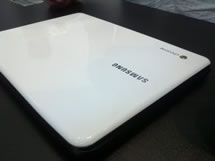
Educators at Millennium Charter Academy in North Carolina are seeing to it that their students will, so to speak, have their heads in the “cloud” this school year.
The cloud refers to where students will store their work from new Google Chromebook model laptops that will be rolled out this fall. According to MCA Director of Development and Information Technology Lu Anne Browne, this is the eighth year of the school’s one-to-one computing initiative—but the first year the school will be using Chromebooks instead of fully featured laptops.
“Our philosophy with technology is to teach our students that it is a tool and not an end in itself,” said Browne. “We want them to be comfortable with the understanding that technology is a wonderful toolbox for them to use to research subjects such as math and history. There are not just research papers but PowerPoint presentations and slide shows students can produce as projects.”
Browne said this approach makes Millennium students comfortable using technology and gives many a head start as they advance to high school already knowledgeable about using laptops and software for school work. She said the school previously had used Macintosh or Windows-based programs on student computers—but the Chromebooks and the application browser software will open up another world of possibilities.
“How many times has a student found themselves in trouble after they haven’t saved or backed up their work and their computer crashes?” asked Browne. “With their information being stored on the cloud, students will not lose their work.”
See also:
New Chromebooks could prove attractive for schools
Companies aim to help schools create digital learning environments
She explained that the Chromebooks rely on the cloud as the source for applications and data storage, connecting to Google’s Chrome browser as the interface for student work in Google Apps. The devices also “boot” up faster (eight seconds) and have a nine-hour battery life. Students can collaborate on projects much easier than they can on laptops that store data in their own internal drives.
Browne did say that some software programs would not be able to run on the Chromebooks, but she emphasized the benefits outweigh that drawback.
“I’m excited,” said Browne. “I think this is the next natural progression of laptops for our children. We want students to not only be consumers of technology but to use technology as producers.” She said that the group from the academy that traveled to McDowell County was impressed seeing students use their Chromebooks “like adults,” even choosing a claymation medium to produce a school presentation.
Browne said that the school is replacing the laptops for its 6- and 7-year-old students with the Chromebook project. She said the academy will maintain a high level of administrative control over websites. The older laptops that are replaced will be re-purposed and used for the school’s math programs and for its teaching assistants.
“This will help parents, too,” added Browne. “Children with internet access to the cloud will not have to take laptops back and forth to school. The ease of collaboration means they can access school work from home, saving wear and tear on their laptop.”
She indicated that the Chromebook project was part of the academy’s board and headmaster’s academic vision for the school where technology gives them a leg up on learning as they progress to higher grades.
Copyright (c) 2012, The Mount Airy News (Mount Airy, N.C.). Visit The Mount Airy News online at www.mtairynews.com. Distributed by MCT Information Services.
- #4: 25 education trends for 2018 - December 26, 2018
- Video of the Week: Dealing with digital distraction in the classroom - February 23, 2018
- Secrets from the library lines: 5 ways schools can boost digital engagement - January 2, 2018

